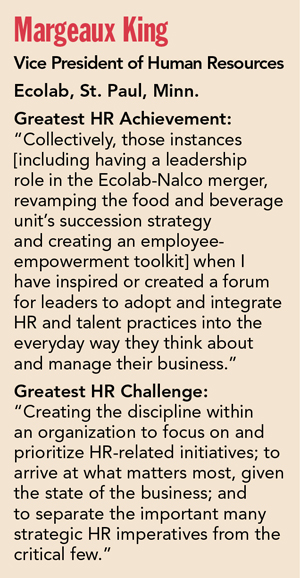This article accompanies Shining Examples.
When Margeaux King was growing up in Minnetonka, Minn., she would watch her artist father and HR-consultant mother, taking life cues where and when she could. Entering the University of Minnesota, with her dad’s influence behind her, she declared her major as interior design.
“Then I discovered I couldn’t draw,” laughs the vice president of human resources at St. Paul, Minn.-based Ecolab. King, who oversees HR for the cleaning and sanitation company’s global food and beverage, and global textile-care businesses, also recalls watching her mother “go into organizations and scan the landscapes and figure out how best to tackle a significant challenge,” she says. “I would watch her go about the problem-solving and thought partnership, then find that nugget or specific area that would make [her solution] a game changer,” King says, “and that’s exactly what I love the most about HR today.” Her mother, she adds with another chuckle, “likes to tell the story of how I came home for a visit from college and said, ‘I think I figured out what I want to do; what you do.’ “
 From 2001 to 2007, King – a 2015 HR’s Rising Star – brought this passion for finding HR solutions to two companies preceding Ecolab where she built HR functions from the ground up: at Hiway Federal Credit Union in St. Paul, and Bloomington, Minn.-based MGI Pharma. In her roles at Ecolab, starting in 2007 as HR manager and advancing to director and then vice president (where she now oversees 3,000 employees between the two businesses), she has always been striving, she says, to “[find] a way to integrate talent and organizational practices into the fabric of the organization versus having them be stand-alone, ‘on-top-of’ sets of initiatives.”
From 2001 to 2007, King – a 2015 HR’s Rising Star – brought this passion for finding HR solutions to two companies preceding Ecolab where she built HR functions from the ground up: at Hiway Federal Credit Union in St. Paul, and Bloomington, Minn.-based MGI Pharma. In her roles at Ecolab, starting in 2007 as HR manager and advancing to director and then vice president (where she now oversees 3,000 employees between the two businesses), she has always been striving, she says, to “[find] a way to integrate talent and organizational practices into the fabric of the organization versus having them be stand-alone, ‘on-top-of’ sets of initiatives.”
For instance, in 2011, when Ecolab announced its largest-ever merger with then-Naperville, Ill.-based Nalco, a provider of chemicals and water-treatment solutions, and King was charged with helping to steer all parts of the talent integration between the two, she went beyond the more standard communication, consultation and administration efforts. She created a toolkit for all managers that contained talking points on subjects they would undoubtedly be faced with or asked about, tips for assessing retention risks, strategies for keeping employees engaged and aligned, and more. She deployed the kits through web conferences and lunch-and-learns, and stayed in close communication with all key leaders to ensure they were being leveraged properly.
In the end, after growing Ecolab’s employee population by more than 40 percent through the merger, from 26,000 employees to 44,000 (that number now stands at 47,000), her company “lost very few people,” she says, “and managers [said they] felt equipped [using the tools in real-time] to handle and manage the retention challenges” inherent in combining two decades-old companies with widely different product sets, geographies and cultures.
King’s toolkit approach – as a way to integrate HR solutions into her organization’s fabric – also worked well during her time as director of Ecolab’s Global IT and Lean Six Sigma functions, from 2008 to 2011. Through formal and informal surveying, and even doing “a little bit of a tour with team members,” King says, she encountered a lack of engagement among IT employees – a sense that they were not fully empowered in their roles, which, in turn, led to a lack of discretionary energy, excitement and engagement within the function.
In studying the problem, King realized the lack of a sense of ownership – of tasks, goals, jobs, etc. – was the biggest contributor to the lack of empowerment, so she created an Empowerment Toolkit that could be leveraged by both managers and associates, online and in person, containing content “to further the idea that creating an environment of empowerment is a shared, two-way partnership – that empowerment is both given and taken,” she says. The tools ranged from ways to conduct more two-way conversations to a five-level empowerment scale itemizing everyone’s level of ownership of responsibility.
“Just knowing and having clarity about one’s level of ownership created a feeling and sense of empowerment,” King says. The tool was so successful in improving IT morale that it’s now used by Ecolab’s entire HR team and across other parts of the organization.
Equally successful was her 2012 redesign of succession planning in the food and beverage division, moving the process from one that simply found replacements for the talents currently in each job to one that looked more holistically at the key leadership roles and the traits therein. She established a talent scorecard and Global Talent Council to oversee and measure very specific development plans for each identified successor. Before King, no such development plan existed.
“Margeaux is the consummate HR business partner … focused on driving the business forward [while caring] about the impact on the individual employee,” says Mary Kaul-Hottinger, vice president of Ecolab’s global businesses HR function and King’s supervisor.
King is also a mother of three who credits her stay-at-home-dad husband, Joe, for keeping all the cogs of the work/life wheels well-oiled and running smoothly. Whether in HR or motherhood, she says, it all comes down to “managing priorities, keeping them in perspective” and remembering “perfection in work and life … doesn’t happen.”

